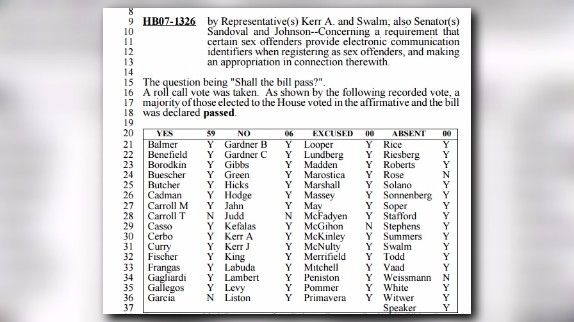The race for Colorado’s Sixth Congressional District is growing uglier by the day.
The National Republican Congressional Committee is out with two ads accusing Democratic state Sen. Morgan Carroll of being soft on sexual predators.
“Carroll was the only Colorado state senator to vote against tougher penalties for child predators using the internet,” according to one of the ads. “Carroll even voted against having convicted sex offenders register their email address and online usernames, making it harder to track online predators.”
These claims are technically true if you look at individual votes on specific days, but that’s not how lawmaking works. Bills bounce around Colorado’s Statehouse collecting votes, amendments and fiscal notes.
And if you follow the bills in these ads throughout their journey, you’ll discover a very different story.
The admakers are cherry-picking votes at different points in the process to fit the story they want to sell you on.
CLAIM: Carroll voted against having child predators register their email addresses & online profiles
VERDICT: Misleading
To back this up, the NRCC points to Carroll’s vote against one bill to register sex offenders, but it ignored Carroll’s vote later that year in favor of a nearly identical piece of legislation.
Back in 2007, Carroll served on the House Judiciary Committee.
A bill came before them to require sex offenders to register their emails addresses, instant messaging accounts and chat room identities.
Carroll and other committee members didn’t like how the bill was written.
The bill didn’t specify who was a sex offender, and it didn’t say who would verify the email addresses or screen names.
Carroll voted against it, and the bill died in committee, which is the vote referenced in the ad.
But a few weeks later, lawmakers introduced another bill that did the same thing , this time with more detail. The new bill was longer and included things like a registration fee, and it required the entity accepting the registration to “make a reasonable effort” to verify the information.
It also carved out an exemption for email addresses provided by employers for use at work so long as the offender isn’t the business owner. Carroll voted for the new bill, and it passed the House.

CLAIM: Carroll was the only Senator to vote against tougher penalties for child predators
VERDICT: Misleading
This claim is similar to the last one, but has a slightly more complicated story.
It’s true Carroll voted against a bill expanding the definition of sexual crimes against children and increasing penalties for convicted predators. But she also voted for it.
To understand how that’s possible, we have to take you into the legislative weeds.
In 2009, then state Rep. Cory Gardner introduced a cleanup bill in the Colorado House of Representatives. The state’s criminal law for internet luring didn’t include texting or instant messaging with children, and Gardner thought those methods of communication ought to be named in the law. He also thought Colorado judges should be able to use the records of convicted sex offenders from other states when considering sentencing.
The bill passed the House and went to the Senate, and this is where things get a little wonky.
Sen. Ted Harvey (R-Colorado Springs) tacked on two amendments to Gardner’s bill.
One amendment would have increased the penalties for failing to register as a sex offender, and the other dealt with giving explicit material to a minor. When the Senate voted on the amended bill, Carroll was the only person to vote against it.
“Morgan’s objection was not to the substance of the amendments,” spokesman Drew Godinich said. “It was that they should be considered as separate bills.”
Here’s where things get really wonky. Colorado has a “single subject” rule that basically says lawmakers can’t bundle a bunch of different bills on different topics together and pass them as one.
The idea is to avoid the kind of horse trading that happens at the federal level in Congress. (Fun example of this: the law that allows carrying guns into national parks was tacked on onto the Credit Card Reform Act.)
Carroll thought Harvey’s amendments violated this rule, especially because Harvey tried and failed to pass one of the amendments as its own bill in 2008.
We can’t say whether the law violated the single subject rule because no one sued to challenge it.
In any event, when the bill passed the Senate, it went back to the House. Why? Because the House had to approve the changes made in the Senate.
The House wanted a conference committee instead. This is where lawmakers from both chambers get together to compromise and combine two versions of a bill into one.
The compromise this time was removing almost all of Harvey’s amendments. The compromise bill went back to the House and Senate for a vote, and Carroll voted for it.
That’s a long, complicated way of saying Carroll took a risk or stand (depending on how you see it) by voting against the bill the first time it came to the Senate floor. She could have been on record against tougher penalties for sexual predators – even if it was for procedural reasons.
But that’s not what ended up happening-- the bill did come back for a second vote, and Carroll did vote for it. Which means her final vote on this bill is on the opposite side of the issue the ad claims. That’s why this claim is misleading.
BOTTOM LINE: Lawmaking is a complicated and often messy process. These ads take snapshots of single steps in the process and use them to spin a story that simply isn’t true.


